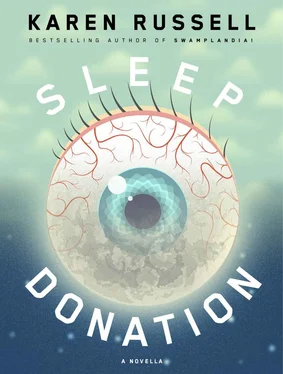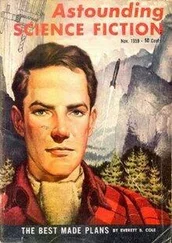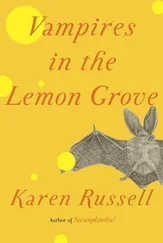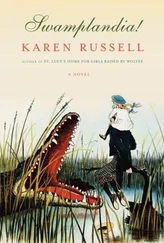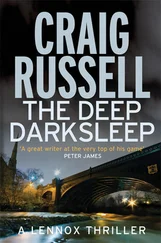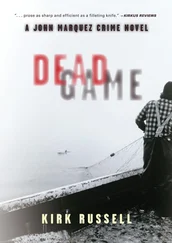Shadows windmill over Felix’s face. Like he’s been caught out, all of a sudden, in some extra-dimensional autumn. Where are the falling leaves coming from? Clouds go racing over the field. Down below, our hands are still clasped. I’m relieved, relieved. I don’t feel like a slave to the contract. I don’t feel that Mr. Harkonnen tricked or frightened me into it. Each time I stare down at our handshake, I feel the same vertigo, a dislocation that is much stranger than mere anticipation, as though I’m being catapulted forward in time, rocketed to my death, perhaps, or to some absolute horizon, where I get a glimpse of my own life massing into form, and a thrilling feel for all that will happen to me now, all that I cannot know, haven’t yet done, haven’t spoken, haven’t thought, will or won’t. Just entering the contract does this. No matter what happens next, I’ll have one constant now, won’t I? Thanks to Felix, my dreams will be twinned to the dreams of his baby. The simple algebra of our arrangement feels like a ladder that he is holding out to me.
“I will not let you down,” I tell Mr. Harkonnen. “I won’t quit.”
He gives me a tight smile, a look I recognize from my own mirror as the winched contentment of a recruiter; the pitch is finished, the contract inked and under way.
“All right. Better get us home.”
Overhead, the sun is fully risen. A flock goes rowing over the pines, and this species I do recognize: they are Pennsylvania starlings. A hundred common gray-black birds, frequent visitors to our childhood backyard. They go shirring through the goggled blues of the May sky, the azure pools of air between the white clouds, moving east, each bird uniformly lit by the round sun. We walk under them, retracing our steps. Eventually Mr. Harkonnen drops my hand, but the world we return through feels solid and good.
Mr. Harkonnen drops me off a block from the Mobi-Office; I’m afraid my colleagues will recognize his brown and turquoise sedan and get the wrong impression. We did spend the night together, but that true statement is so misleading that I think it’s worse than a lie. It’s 7:02 a.m. But I see that as early as I am, I’m still not the first staffer to punch in.
“Hey,” says Jim.
“Hello,” I say.
The Tuesday following my strange dawning with Mr. Harkonnen, an alert calls every staffer into the trailer. We fish-gape around Rudy’s computer. Headquarters does a live broadcast from the D.C. offices, so that we learn about the Chinese orexins and electives fractionally faster than the rest of America.
Breaking news: several dozen patients suffering from the orexin-disruption have sought treatment at the Sanya Hospital in Hainan Province, China. This medical milestone delivers a quiet shock to all of us in the Mobi-Van. Naively, we now realize, we believed the dysfunction was bounded by our hemisphere, peculiar to American sleepers. But here is proof that nobody is quarantined by geography —that anybody, anywhere, might become an orexin.
It gets worse.
Fourteen Chinese insomniacs in Hainan Province have also tested positive for the Donor Y nightmare. These people received sleep transfusions from an unknown source. The Corps was unaware of the existence of Chinese sleep clinics offering REM-transfusions for cash. Initial reports suggest that the fourteen Chinese men and women infected with the Donor Y — prion now exhibit an “extreme sleep aversion” similar to what we’ve seen with American elective insomniacs.
Presently, our doctors know so little about how the nightmare is spreading that they can only describe symptoms, guess at causes. But it’s clear that my assurances were wrong. His dream is unchained, hopping bodies. The nightmare contagion is uncontained.
Jim calls me into his office.
“Are you avoiding me, Trish?”
“Ha-ha. That would be a ninja-feat, wouldn’t it, Jim? Avoiding you in this trailer.”
“We barely speak.”
I touch my throat, as if to suggest I have a common cold. At the same time, I feel this to be an accusatory gesture; Jim must know, of course, that his secret is the obstruction.
“Who are you talking to these days? I wonder.”
But then the door comes unhinged; Rudy steps in.
In the narrow trailer window, I watch our faces darken like loaves in an oven.
“Huh,” he says mildly. “Am I interrupting something?”
“I’m talking to Trish. As per our discussion.”
“Oh. Right. We don’t think it’s a good idea for you to spend quite so much time with Baby A’s family.”
“It’s just not professional…”
“Or it’s too professional. They don’t need that much from you, Edgewater.”
“Your talents are now needed elsewhere.”
“With the insomnia appearing on every continent…”
“With the nightmare-infection spreading…”
“Globally, we’re going to have new initiatives, new responsibilities…”
The happiness comes on me like a sickness I can’t stop. I feel myself go fully automatic. A smile swarms onto my face, and somehow I am nodding at the brothers, taking notes. For a second it feels like old times to me, to stand under the headlamps of the brothers’ concern. Not just for me, but for the entire planet; listening to them rant about the world in peril has always given me the most unlikely sense of security, made me feel like I am safely in the center of a rapidly enlarging family. And I think back to the night three weeks ago when I stood between Justine and Felix Harkonnen, staring through the glass into Ward Seven.
“I feel responsible for them,” I say, staring from Jim to Rudy. “The Harkonnens.”
“You’d better get over that,” Rudy snarls. “You’re not.”
Baby, baby. We’re in a pickle now, aren’t we, baby?
“Hush, hush,” I murmur, bouncing her around the Van.
It feels as if we’re orbiting the same black hole. Her sleep will not stop flooding through her, shadowing her blood. My sister’s ghost regenerates as one lean memory —the final hospital scene keeps doubling back on itself, repeating. So far, I’ve been diligent about making the matching donations. Many nights now, Baby A and I are going under sedation in tandem. Yesterday evening, for example, Nurse Carmen drew five hours from Abby in the Sleep Van, and I gave five hours at the Bank.
Mrs. Harkonnen now refuses to let anybody but me touch Abigail before the procedure begins. Thank God, there’s not much to the prep —just rocking her to sleep, the basic bob-and-shush, the lullaby-bounce-step, that Dori and I perfected when we babysat in middle school. The nurses sterilize the helmet, spin-dry the colorless lozenge of the face mask. We hook the little bellows of her lungs to the larger bellows of our need.
They really do trust me now, Mr. and Mrs. Harkonnen. Somehow I passed their independent screenings. They think I am sincere.
Another influx of misplaced faith that I must queasily endure, and assimilate into my body, for the greater good, says Rudy, who does pay attention, and who has noticed how my cheeks flame around Jim.
In a fairy tale, I would take Mrs. Harkonnen aside, suggest a scheme to deliver her daughter from our gloved hands, some prudent metamorphosis: We’ll smuggle her out as a bear cub, a red rose, an eagle. We’ll find some magical pair of shears to free your girl, I’d promise her. We’ll cut you loose from the messy rest of us.
Instead, I show them our latest promotional video. It’s genuinely uplifting —testimonials from survivors who received their daughter’s sleep transfusion. You can tell from the flat surf of each voice that a wave within them has crested and broken, and they are now safe on some far shore:
Читать дальше
